Address
304 North Cardinal St.
Dorchester Center, MA 02124
Work Hours
Monday to Friday: 7AM - 7PM
Weekend: 10AM - 5PM

On April 19, 2025, Chinese People’s Liberation Army Air Force jets touched down at an Egyptian airbase for a joint drill dubbed Eagles of Civilization 2025 — the first of its kind between the two nations. The exercise will run through early May, and at face value, it may appear to be just another symbolic foray in Beijing’s growing global military diplomacy.
But nothing about this moment is symbolic.
This isn’t simply a flight plan shared over the Sinai. It’s a rupture — a visible crack in the brittle architecture of U.S.–Israeli regional hegemony. For decades, American military aid has ensured that Egypt stayed obedient and strategically neutered. For decades, Israel has enjoyed uncontested air superiority and diplomatic impunity for even its most grotesque wartime excesses. And for decades, the illusion of regional consensus was maintained with bombs, aid packages, and silence.
Now, one of America’s most funded allies has invited its principal rival to take to its skies. That’s not a drill. That’s a message.
And the message is this: the world is no longer unipolar. Not in Asia. Not in Africa. And not in the blood-drenched sand between Gaza and Rafah.
This joint China–Egypt air force exercise does not announce a new alliance of benevolence. China is not here to save anyone. But it does signal the end of something else — the era of uncontested Western security monopoly in the Middle East. The ground is shifting. The skies are shifting. And the balance of power, long frozen, just moved.
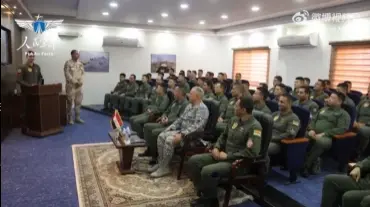
To understand the gravity of the China–Egypt drill, you have to start with the architecture it threatens to collapse — the one Washington built, Tel Aviv perfected, and Cairo was paid to uphold.
For over four decades, Egypt has been the keystone of the U.S.-engineered security order in the Middle East. After the Camp David Accords in 1978, Washington sealed its victory by binding Egypt into a permanent client state relationship. Since then, over $50 billion in U.S. military aid has flowed to Cairo. Fighter jets, tanks, counterterrorism training, surveillance systems — all of it built not to empower Egypt, but to ensure its silence.
Silence when Israel bombed Lebanon in 2006. Silence when Israel turned Gaza into an open-air prison. Silence when Israeli warplanes targeted journalists, children, and aid convoys in 2023 and again in 2024. Silence when Rafah was set on fire.
The logic was simple: subsidize Egypt’s security elite, and they’ll keep the Arab street pacified. Make Cairo complicit, and it can never credibly dissent.
This model worked. Until now.
Eagles of Civilization 2025 is not a protest — it’s a recalibration. For the first time since Camp David, Egypt has invited a rival power into its military infrastructure not to appease Washington, but to hedge against it. That invitation is not reactive. It is structural. Because the structure the U.S. built is collapsing — under the weight of Israeli impunity, American decline, and the unrelenting broadcast of war crimes from Gaza to the Gulf.
The world watched as U.S. weapons ripped apart Palestinian children. The Arab world watched. And Egypt — the supposed stabilizing force — is no longer willing to be seen holding the leash while the watchdog mauls the neighborhood.
What we’re witnessing is not anti-Americanism – well surely there is a bit of it, deservedly – and for good measure.. It’s strategic decoupling, born not from ideology but from necessity. Egypt doesn’t need to abandon the U.S. to signal autonomy. It just needs to stop pretending that loyalty is free, limitless, and blind.
The American era in MENA isn’t over. But the illusion that it can last forever — that just died at an Egyptian airfield with a Chinese jet on the tarmac.
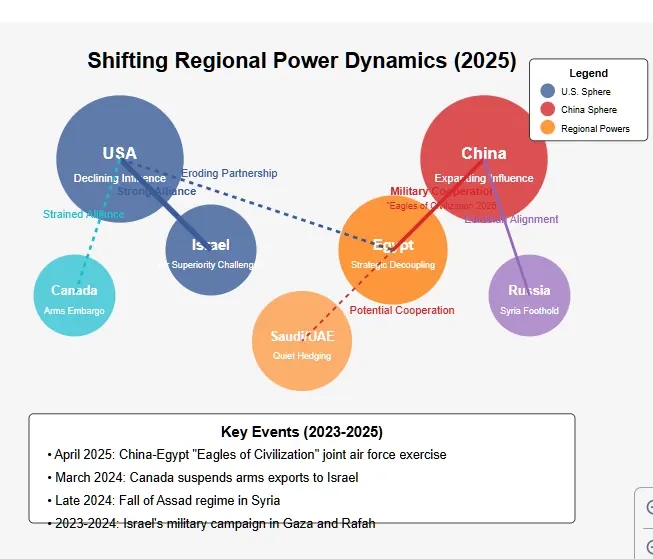
China doesn’t export democracy. It exports leverage.
The Eagles of Civilization 2025 drill is not an outlier. It’s the logical extension of a twenty-year pattern: soft power through debt diplomacy, hard power through invitation. While American influence arrives on the wings of think tanks, aid conditionalities, and the occasional drone strike, China prefers concrete, contracts, and quiet footprints — until now.
This is not Djibouti. This isn’t a belt-and-road deal tucked inside a dry port. This is Chinese air power executing joint tactical maneuvers on foreign soil, thousands of miles from home — with a military trained to operate in information-denied environments. And Egypt, the U.S.’s second-largest aid recipient and historically the most dependable Arab autocracy, has just opened the door.
The implications go beyond airframes and flight patterns.
Behind every drill is doctrine. Behind every joint exercise is a quiet exchange of tactics, frequencies, and—most importantly—access. Access to electromagnetic signatures. Access to NATO-standard systems. Access to countermeasures and radar arrays still interoperable with U.S.-supplied platforms. If Chinese technicians or observers get within range of F-16 avionics or U.S.-standard battlefield networks, that’s not a partnership — that’s a reconnaissance opportunity.
It’s also a real-world training opportunity for the PLA Air Force, which has limited exposure to complex regional airspace. Flying in Egypt’s corridors—along the Suez, across Red Sea-adjacent buffer zones—gives Beijing experience it cannot replicate over Taiwan or Xinjiang.
Critically, Egypt has not cut ties with the U.S. to do this. It hasn’t even shifted alliances. It’s simply diversified. And that diversification hurts Washington more than defection ever could, because it proves to the rest of the world that U.S. loyalty is no longer a monopoly—it’s a bid to be weighed against other offers.
China doesn’t sell itself as a moral actor. It doesn’t have to. Its pitch is clear:
For Egypt, that offer came at exactly the right time. For the U.S., it’s a nightmare scenario: a world where states no longer need to defect to drift away.
This isn’t a Cold War redux. It’s something worse: a slow-motion cascade of formerly reliable clients learning that sometimes, two air forces are better than one.
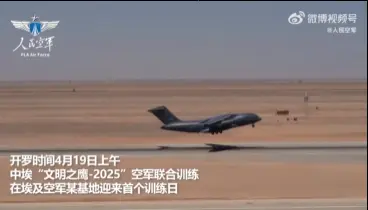
There’s a red line that runs from Gaza to Cairo. It is not strategic. It is visceral.
As Israeli bombs flattened Rafah, targeting refugee camps and slicing through aid convoys, Egypt watched with growing unease. Not because it was shocked—Egypt has witnessed every iteration of Israeli brutality—but because this time, it couldn’t guarantee that silence would hold.
The so-called “Arab contract” — where regimes normalize relations with Tel Aviv while their populations seethe — has always been a delicate balancing act. In Egypt, it has teetered on the edge of collapse for years, held in place by bread subsidies, mass arrests, and carefully managed apathy. But Rafah was different.
Rafah is not some abstract battleground. It is a city Egypt shares a border with. It is the back door through which aid trickles in and people sometimes escape. It is also the front line of Cairo’s complicity. And when footage of burned children and blood-drenched tents ricocheted across the Arabic internet, that complicity became unbearable—not just morally, but politically.
President Abdel Fattah el-Sisi knows this. He’s not a populist, but he is a survivalist. His regime, battered by inflation, foreign debt, and food insecurity, cannot afford to be seen as a subcontractor for Israeli genocide. Hosting Chinese jets isn’t just strategic theater—it’s domestic pressure release. It is a symbolic decoupling from the Tel Aviv-Washington axis without severing the cash flow.
Letting the People’s Liberation Army fly missions from Egyptian soil sends a signal not just to Israel, but to Egyptians: We are not anyone’s dog. Not anymore.
Of course, Cairo still maintains formal peace with Israel. And of course, it still depends on U.S. military aid. But the line between collaboration and subservience is thin, and in the Arab street, perception is policy. Sisi doesn’t need to sever ties with Israel—he just needs to convince enough Egyptians that he isn’t enabling the killing of their neighbors for free.
This drill gives him that narrative. Even if superficial, even if symbolic, it breaks the illusion of Egyptian impotence. And that matters. In authoritarian regimes, perception is oxygen. If people believe the regime is acting in their interest, they’re less likely to set the streets on fire.
But if Egypt had refused to act—even in optics—it would have risked moral collapse. Not among the elite, but in the alleyways and marketplaces where politics simmers until it explodes.
Eagles of Civilization 2025 is Egypt saying, “We saw what happened in Rafah. And we’re not going to keep playing dumb.”
It’s too little. It’s too late. But in a region defined by silence, it’s something.
Let’s get one thing straight: China is not a moral actor.
Its leadership has orchestrated the mass internment of Uyghurs in Xinjiang, silenced dissent with brutal efficiency in Hong Kong, and built a surveillance state that makes Orwell’s nightmares look quaint. It jails poets, vanishes critics, and exports its authoritarian model through fiber-optic cable and facial recognition software.
But morality isn’t the currency of geopolitics—leverage is.
And in the Middle East of 2025, where Israeli forces are live-streaming the slow annihilation of Gaza and American officials respond with press releases and weapons transfers, the bar is not high.
Egypt is not embracing China because Beijing is virtuous. It is engaging because China is not actively complicit in the mass killing of its neighbors. In this region, that qualifies as restraint.
The decision facing Arab governments isn’t between right and wrong—it’s between unipolar impunity and multipolar ambiguity. One option comes with bombs and vetoes. The other comes with ports and plausible deniability. Neither comes with justice. But one at least offers distance from the corpse pile.
Israel’s moral collapse isn’t just a tragedy. It’s a strategic liability. And Washington’s refusal to intervene—to sanction, to cut arms, to even condemn—has made it impossible for Arab regimes to keep pretending that the West is a benign hegemon. China doesn’t pretend to be benign. That’s part of its appeal.
Multipolarity doesn’t mean better options. It means options at all.
And when the only two diners at the table are offering you a choice between slow erosion and immediate annihilation, you pick the one that lets you breathe long enough to plan your next move.
For Egypt, that move was simple: let the Chinese fly.
It won’t absolve Beijing’s sins. It won’t erase Israel’s. But it might put just enough friction into the system to slow the next atrocity. In the absence of justice, balance is the last defense of the powerless.
And right now, even a symbolic act of balance—like a PLA jet landing in Cairo—is more than anyone else has dared to offer.
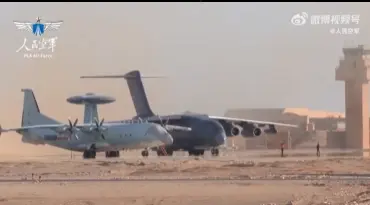
In March 2024, something happened that would have been unthinkable even five years prior: Canada announced a suspension of arms exports to Israel.
No weasel language. No “review in process.” No hidden carve-outs. For once, Ottawa did something real—directly challenging Israeli behavior and, by extension, the U.S. diplomatic machine that enables it.
It was a small act in the global scheme, but symbolically massive. It marked the first time since the Camp David Accords that a Five Eyes ally broke with Israel in the middle of an active military campaign. And it happened under the leadership of a Canadian prime minister who has spent much of his tenure trying to be a more progressive echo of American foreign policy.
So why now?
The answer, bluntly, is Trump.
With Donald Trump back in the White House for a second term, U.S. foreign policy has entered a new phase of volatility and transactionalism. American credibility is collapsing. Alliances are fraying. Institutions that once gave Ottawa predictable cover—NATO, the UN, the G7—are increasingly paralyzed or irrelevant.
Canada is no longer just an adjunct to U.S. power. It is an awkward satellite drifting between gravitational pulls: Washington’s crumbling hegemony, and Beijing’s relentless ascent.
Trudeau’s embargo wasn’t just a humanitarian gesture—it was a signal that Canada no longer trusts the U.S. to lead responsibly, at least not when it comes to Israel. But here’s the catch: while Canada is willing to cut arms to Tel Aviv, it’s still politically incapable of acknowledging China as anything other than a threat.
Huawei. The Two Michaels. Election interference allegations. Every episode has further poisoned public discourse, making strategic neutrality almost impossible to sell domestically. And so Canada is stuck—criticizing Israel, but unable to embrace the emerging multipolar world with any clarity or confidence.
Egypt’s move—hosting Chinese jets—was unambiguous. Canada’s isn’t.
Until Ottawa develops a strategy for dealing with both superpowers on its own terms, it will continue to lurch between moments of principle and paralysis. The embargo on Israel was historic. But history won’t wait around for Canada to decide who it wants to be.
If the future of foreign policy is cold, multipolar realism, Canada needs to stop pretending it still lives in 1995 and recognize the America is an existential threat to Canada.
If geography is destiny, then Egypt has always been at the crossroads of empires. The Suez Canal isn’t just a marvel of 19th-century engineering—it’s a living artery through which 12% of global trade flows. Oil, grain, arms, electronics—everything passes through the chokepoint that splits continents.
This isn’t paranoia. It’s strategic math.
PLA presence in Egypt doesn’t mean China controls the canal. But it does mean China now has a kinetic footprint within striking distance of a chokepoint that has, until now, remained under implicit Western security management. It’s not hard to imagine a near-future scenario where China leverages this positioning diplomatically, economically, or—if necessary—militarily.
It also opens the door to broader maritime access. This drill could be the prelude to future naval visits, surveillance overflights, or dual-use port deals along the Red Sea corridor. With Houthi strikes destabilizing commercial traffic and piracy seeing a low-key resurgence off the Somali coast, Egypt’s cooperation becomes more valuable than ever—and Beijing knows it.
And let’s be honest: the U.S. can no longer assume automatic access or loyalty from its so-called allies. Egypt isn’t defecting. But it is diversifying. And in the age of chokepoint warfare, diversification is a weapon in itself.
The West no longer owns the canal. It never did. But for the first time in decades, it may soon have to negotiate its continued access—with a rising power whose jets now land just a short flight from the Mediterranean.
In a world where shipping lanes are national arteries, the ability to flex over a chokepoint like Suez isn’t symbolism. It’s sovereignty.
Riyadh didn’t say a word. Abu Dhabi smiled politely. But make no mistake — Eagles of Civilization 2025 has the full attention of the Gulf.
The United Arab Emirates and Saudi Arabia are not going to host Chinese fighter jets tomorrow. Their defense infrastructure is too deeply tied to the U.S., and their elites too embedded in dollarized wealth systems to risk open defiance. But they don’t need to. They’ve already started hedging.
The UAE, in particular, has been quietly opening channels with Beijing for years — through port deals, telecom infrastructure, and security cooperation cloaked in economic development. Saudi Arabia, once the centerpiece of American oil diplomacy, is now simultaneously courting Chinese petro-yuan trade, Russian arms deals, and a potential BRICS alignment.
These moves don’t reflect anti-Americanism. They reflect post-American realism.
The China–Egypt air drill isn’t just a bilateral affair; it’s a signal. It tells the Gulf monarchies that engaging with China is no longer taboo. It can be done publicly. It can be done militarily. And the Americans won’t—or can’t—stop it.
This is why the drill matters beyond Egypt. It normalizes behavior that was previously unthinkable. It lowers the cost of strategic deviation. And in a region where no one wants to be first—but no one wants to be last—Egypt just kicked open a door everyone has been circling.
The Saudis and Emiratis aren’t defecting. Not yet. But they are watching. Closely. And with every PLA takeoff from Egyptian soil, the idea of a “pivot” becomes less heretical and more inevitable.
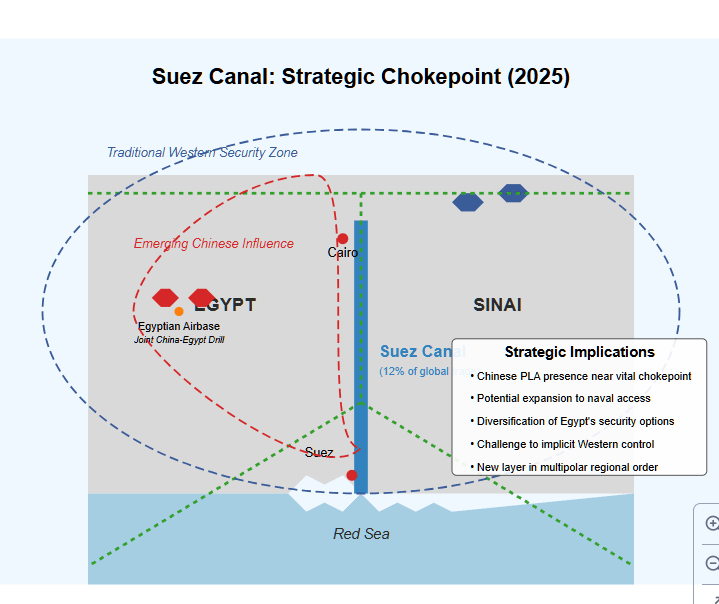
Syria used to be the centerpiece of Russia’s military reentry into the Middle East. But that chapter ended abruptly.
With the fall of Bashar al-Assad in late 2024, the regional board has been reset. Damascus is no longer ruled by a Kremlin-aligned strongman, but by a fragile transitional government trying to reconcile militias, Kurdish factions, and the legacy of a decade-long bloodbath. Assad fled to Russia. His palaces now host bureaucrats and UN monitors.
But in the power vacuum he left behind, the game didn’t stop—it just opened up.
Russia, while distracted by Ukraine, still maintains a foothold in western Syria. Its naval base at Tartus and air operations at Khmeimim remain active, guarded, and symbolically essential. China, meanwhile, has not committed boots or bombers, but it’s watching. Closely. Syria’s post-Assad reconstruction is a canvas for influence, and both Moscow and Beijing are quietly jockeying for position.
The formula is simple: Russia brings war-tested infrastructure and relationships with residual loyalist networks. China brings capital, engineers, and diplomatic weight in the UN. The transitional Syrian government, desperate for investment and legitimacy, may welcome both—willingly or otherwise.
This is the new Eurasian layer: not built on ideology, but on extraction and entrenchment. As U.S. presence thins and the Gulf remains cautious, Russia and China are carving new roles for themselves not just in Syria, but in the region’s post-U.S. future.
Egypt’s drill with China must be viewed in this context. It’s not just an isolated bilateral exercise. It’s part of a larger tapestry in which Eurasian powers are establishing overlapping spheres of influence, not by treaty, but by tempo: who moves first, who builds fastest, and who fills the void.
Assad is gone. But the contest for Syria—and the soul of the region—is just beginning.
For nearly five decades, Israel has operated under the assumption of regional air superiority. Not just in capability — in perception. It fought on its own terms, at its own tempo, with no serious concern that any regional actor could contest its skies.
That era just ended.
Eagles of Civilization 2025 won’t change the hard math of Israel’s technological edge overnight. The IDF still fields advanced F-35s, Iron Dome batteries, and a deeply integrated intelligence ecosystem supported by the United States. But the exercise punctures something arguably more important than hardware: the assumption of impunity.
When a Chinese fighter jet lands in Egypt, it doesn’t threaten Tel Aviv directly — it challenges the premise that Israel is the only actor capable of setting the terms of air conflict in the region. It says: You are no longer the only one who matters.
This shift is not theoretical. In Tel Aviv, IDF planners are now being forced to model scenarios that include non-aligned powers operating just outside their traditional buffer zones. Beijing isn’t building an anti-Israel axis, but its presence forces Israel to recalculate. How would it react to a future in which Egypt hosts not just exercises, but air defense systems that aren’t interoperable with U.S. systems? Or worse — are designed to detect or deter Israeli overflights?
The psychological advantage Israel has enjoyed since 1973 — the freedom to launch preemptive strikes without fear of retaliation from sovereign air forces — is under pressure. Egypt doesn’t need parity. It just needs a credible alternative.
And if that alternative includes Chinese ISR (Intelligence, Surveillance, Reconnaissance) support, real-time coordination, or even passive threat detection systems, Israel’s airspace planning becomes contested by implication, even if no missile is ever fired.
For now, the drill is symbolic. But Israel’s regional dominance has always depended on symbolism. From the Six-Day War to the Gaza campaigns, it has survived on deterrence, not defense. That deterrence is eroding. And once perception shifts, doctrine follows.
The IDF doesn’t need to lose a war to lose its edge. It just needs the neighborhood to stop being afraid of fighting one.
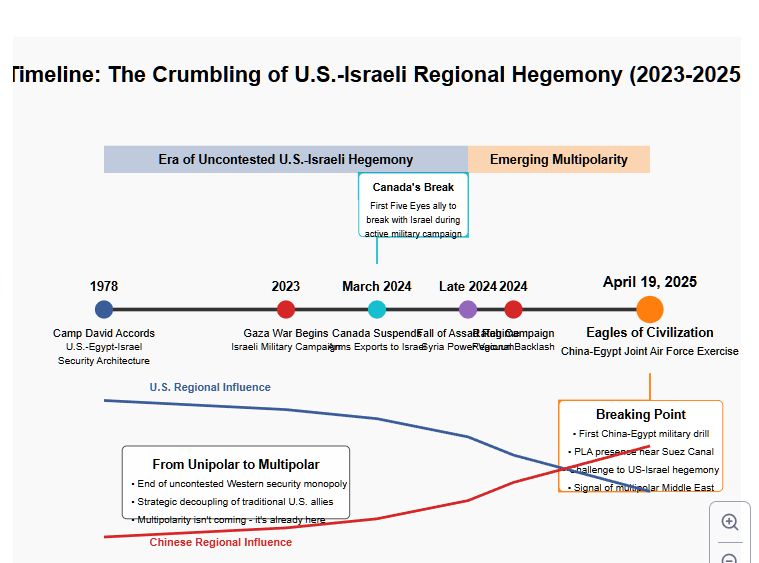
For decades, the United States enforced discipline in the Middle East through a combination of carrots, sticks, and carefully crafted illusions. When Egypt drifted too far from Washington’s orbit, it was punished with diplomatic isolation or threats to the $1.3 billion in annual military aid. The system worked because coercion worked. Washington could threaten, and Cairo would blink.
That formula is broken.
Egypt understands this. So does China.
Eagles of Civilization 2025 wasn’t launched in spite of U.S. threats. It was launched because the U.S. no longer has credible threats to make. Sanctions? Egypt will pivot further to the BRICS bloc. Diplomatic backlash? Cairo has already endured it during the Arab Spring. Aid suspension? China, Russia, and the Gulf have cash—and fewer questions.
What we’re seeing isn’t defiance. It’s rational adaptation to an empire that’s forgotten how to manage its clients.
CENTCOM might issue stern press releases. The State Department might brief journalists off the record about “disappointment.” But there will be no real consequence. The United States is stretched too thin, too fractured, and too consumed by its own internal collapse to dictate terms in the Middle East anymore.
And here lies the quiet horror for Washington: loyalty is no longer enforced, and it is no longer rewarded. For Cairo—and likely others—it is no longer even expected.
The void isn’t just moral. It’s strategic. American power still exists, but its ability to command obedience without consequence is over.
And when coercion stops working, hegemony becomes nostalgia.
The roar of a Chinese engine over Egyptian soil may not stop a single Israeli bomb. It won’t undo decades of U.S. complicity or bring back the dead from Gaza’s ruins. But it matters — because it breaks the silence that made those things possible in the first place.
For years, the Middle East has functioned under a rigid security architecture: Israel decides, the U.S. enables, and the Arab world absorbs. That model is cracking. Not all at once. Not through war. But through quiet, deliberate acts of resistance like Eagles of Civilization 2025 — acts that remind the region that balance is not betrayal, and alignment is not fate.
Egypt hasn’t joined an axis. China hasn’t declared a new order. But they’ve done something far more destabilizing: they’ve shown that there are other ways to fly.
In a post-Assad Syria, in a divided Gulf, in an occupied Palestine, and in a Canadian government that just embargoed Israel for the first time, the same story plays out: multipolarity isn’t coming. It’s already here.
And it doesn’t care what Washington thinks.
The old order isn’t collapsing in fire. It’s eroding in dust, in drills, in defections that never quite announce themselves.
So let the engines roar.
History won’t remember the sound. But it will remember what finally made someone else listen.
[…] calculus. It fears the contagion of militancy in Sinai, but more recently, its posture has shifted. With Egypt hosting joint military drills with China for the first time in April 2025, it becomes cle… The narrative of “security” is elastic. It stretches to fit whomever is […]